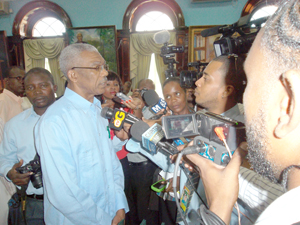By Svetlana Marshall –
The opposition on Wednesday night passed a motion calling on President Donald Ramotar to establish a commission of inquiry to probe the incidence of human trafficking in Guyana. Government did not support the motion, which was moved by Opposition Leader David Granger.
“This motion is a motion about humanity, it’s a motion about the type of society we want to live in, it’s a motion about our children and it’s a motion about the future of our country,” the A Partnership for National Unity (APNU) chairman said in his opening remarks as he sought to win the House’s approval.




